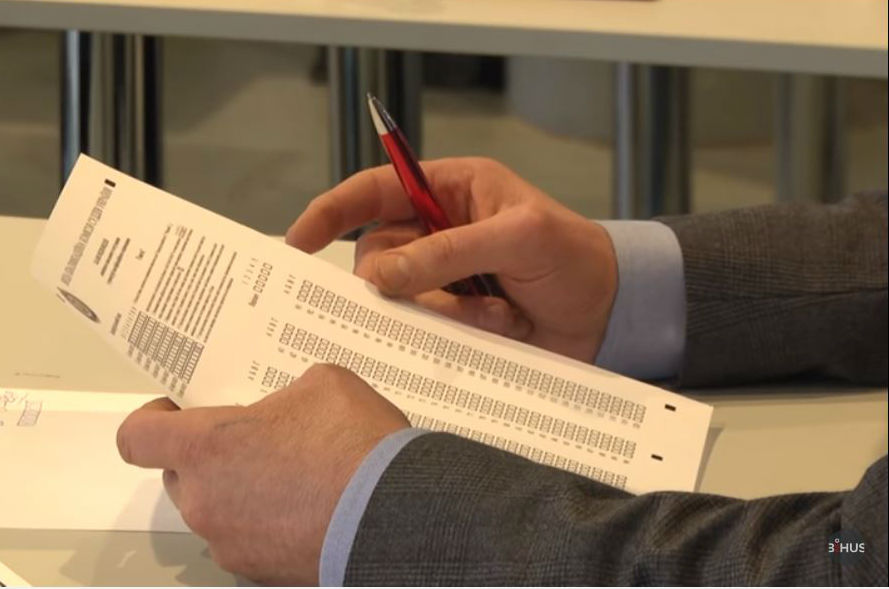 Sergiy Koziakov, the head of the High Qualification Commission of Judges (HQCJ), calls the selection process for Ukraine’s new Supreme Court a model process but overlooks the actual results.
Sergiy Koziakov, the head of the High Qualification Commission of Judges (HQCJ), calls the selection process for Ukraine’s new Supreme Court a model process but overlooks the actual results.
Ukrainians, tired of assessing never-ending processes, are judging the competition by its results. The hours of interviews with the candidates, the fact that interviews were broadcasted online, and the HQCJ’s cooperation with civil society are positive steps, but not enough. The bottom line is this: will the process bring any new faces to the Supreme Court?
The competition is nearly complete, and the results speak for themselves. Some of Ukraine’s most notorious judges who are the very symbols of corruption have aced the competition and are likely to become part of the “new” Supreme Court.
Among the 120 that the HQCJ intends to recommend are judges who violated human rights; judges who prohibited peaceful protests and participated in political persecution; and candidates with an obvious mismatch between their assets and declared income.
It’s clear that the HQCJ’s so-called “transparent procedures by European standards” have not filtered out dubious candidates.
Here’s what Koziakov left out of his update on the process:
- Some of the finalists have issued decisions that violate human rights, as the European Court of Human Rights (ECHR) has recognized. The ECHR had to rule twice on behalf of a 97-year-old woman fighting for her property rights, as ECHR’s first decision was ignored by Yaroslav Romaniuk and Inna Berdnyk, acting judges of the Supreme Court. Both Romaniuk and Berdnyk successfully passed through the “model process” and may get a job on the new Supreme Court.
- Candidates with a mismatch between their assets and declared income have not been disqualified. A mismatch between a public officials’ assets and declared income is the main indicator of corruption in Ukraine. Judges make somewhere between $600 to $3,000 per month, which isn’t enough to justify an affluent lifestyle. Nevertheless, the HQCJ accepted candidates who cannot explain all of their sources of income. One candidate, Judge Tetiana Kozyr, has a retired mother who owns four apartments, land, and a house, but is unable to show sources of income for such wealth. Ukrainian legislation sees this as a possible sign of illicit enrichment of a judge.
- Judges who prohibited peaceful protests when Viktor Yanukovych was in power may make the final cut. During the Euromaidan, Yanukovych tried to use a judicial prohibition on peaceful protests to suffocate mass protests. Even though judges who issued these decisions were subject to lustration, the HQCJ has refused to disqualify at least four candidates who did so.
- Candidates who made “politically motivated decisions” also made the final round. The HQCJ conveniently ignored the most obvious qualification that compromises a candidate’s eligibility: the ability to issue an apolitical judgement and follow the law wherever it may lead. At least nine candidates still in the running for Supreme Court judgeships lied in their integrity declarations, which is a mandatory part of application process. They tried to hide their participation in political persecution. For example, judges Sergiy Slynko and Viacheslav Nastavniy failed to indicate that in 2013 they adopted a decision against Yuriy Lytsenko, former minister of interior affairs and now prosecutor general, while the Council of Europe recognized the case as politically motivated prosecution.
Ukraine’s new Supreme Court cannot accept these tainted judges. According to its own bylaws, the HQCJ must consider the defects of the candidates that we’ve outlined; it cannot ignore proven and publicly known facts about a candidate violating human rights or participating in political persecution, regardless of whomever gave these facts to the HQCJ.
The most galling part of the competition and Koziakov’s article is that he thinks Ukrainians will fall for the elaborate process. We won’t. No one trusts Ukraine’s courts, and rebooting the Supreme Court was meant to address this problem. Ukrainians trust the judiciary only slightly more than Russian media, while foreign businesses name a lack of trust in the courts as the second major obstacle to investment.
The HQCJ is not supposed to judge whether a candidate is guilty of illicit enrichment or abuse of power. But it is supposed to select candidates whose profile is beyond reproach and ones who will restore trust to the judiciary.
The HQCJ still has a chance to disqualify questionable candidates. It is compiling final ratings now. However, the ratings are based on complicated subjective scores, given at the discretion of HQCJ members or based on the results of private psychological testing. Therefore, the HQCJ has an opportunity to give high scores to the above-mentioned dubious candidates, even after the many hours of broadcasted interviews and dozens of published judicial profiles.
If the HQCJ appoints candidates with unjustified assets, fraud in declarations, past decisions against human rights or politically motivated rulings, Ukraine’s large, loud, and powerful civil society will consider the competition an abject failure. We will not accept “transparent procedures” that make a mockery of the reform process.
Anastasia Krasnosilska is the advocacy officer at the Anticorruption Action Center in Kyiv, Ukraine.
Image: Ukraine is in the process of building a new Supreme Court. The process has involved a number of tests and interviews. Courtesy Screenshot: Our Money.
